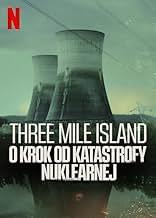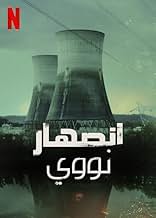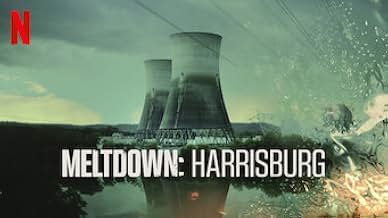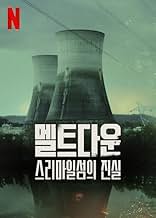IMDb RATING
6.8/10
5.8K
YOUR RATING
Insiders recount the events, controversies and lingering effects of the accident at the Three Mile Island nuclear power plant in Pennsylvania.Insiders recount the events, controversies and lingering effects of the accident at the Three Mile Island nuclear power plant in Pennsylvania.Insiders recount the events, controversies and lingering effects of the accident at the Three Mile Island nuclear power plant in Pennsylvania.
- Awards
- 5 nominations total
Browse episodes
Featured reviews
{NOTE: the 1-star review "Do not watch for accurate facts" is relevant (but also incomplete) IMHO}
This documentary is excellent ... by Netflix standards. An example of a terrible documentary is the one they did on MH370, which was overly-long and spent copious time on inane conspiracy theories.
Meltdown: TMI goes a great job showing the cover-up attempts and related corruption, as well as the toll on the residents. It does NOT do a good job explaining the details of the initial accident and the misguided response. You have to have a VERY good reason to turn off cooling pumps and/or High-Pressure Injectors (HPI) when a reactor's temperature is getting out of control, and this was poorly explained. To be fair, some details of this accident were NEVER properly explained (see Wikipedia), but still -- Netflix could have done a better job, instead of showing the same distraught locals over and over and over again.
There are some unanswered questions. The NRC still claims very little radiation was released, despite the dead fish observed and a least one person with radiation "burns" (lesions) over much of her body. What happened to this person? Why wasn't she Exhibit A in (eventually) refuting the platitudes the NRC and GPU (the plant owner) told the public?
This documentary had the potential for ten stars. However, given the flaws, I'm giving it eight (8) stars. Mind you, it's still gripping and effective; I'm still angry the next day. FYI, I'm an engineer and have some actual knowledge of the cooling systems and related thermodynamics. I even tested my knowledge on a NPP failure simulator.
This documentary is excellent ... by Netflix standards. An example of a terrible documentary is the one they did on MH370, which was overly-long and spent copious time on inane conspiracy theories.
Meltdown: TMI goes a great job showing the cover-up attempts and related corruption, as well as the toll on the residents. It does NOT do a good job explaining the details of the initial accident and the misguided response. You have to have a VERY good reason to turn off cooling pumps and/or High-Pressure Injectors (HPI) when a reactor's temperature is getting out of control, and this was poorly explained. To be fair, some details of this accident were NEVER properly explained (see Wikipedia), but still -- Netflix could have done a better job, instead of showing the same distraught locals over and over and over again.
There are some unanswered questions. The NRC still claims very little radiation was released, despite the dead fish observed and a least one person with radiation "burns" (lesions) over much of her body. What happened to this person? Why wasn't she Exhibit A in (eventually) refuting the platitudes the NRC and GPU (the plant owner) told the public?
This documentary had the potential for ten stars. However, given the flaws, I'm giving it eight (8) stars. Mind you, it's still gripping and effective; I'm still angry the next day. FYI, I'm an engineer and have some actual knowledge of the cooling systems and related thermodynamics. I even tested my knowledge on a NPP failure simulator.
I didn't feel like this was about fear in nuclear energy. This event set it back, but it's still viable and prevalent. This is about human error, regulation failure, and high level corporate and government corruption.
A few years after the meltdown, I was working for Air Products and Chemicals, an industrial gas company as a sales rep out of York, PA. TMI was my account and I went up there to do a cylinder count as they were paying thousands a month in rental charges for 5000 cylinders that had been on the island for 10 or more years. After my walk through I found only 200 cylinders. Big mystery until I talked to an old timer at the plant. Seems at the time of the meltdown and thereafter, employees would take full cylinders with 3000 psi, over to an embankment overlooking the Susquehanna River, lay them across two railroad ties and then knock the heads off the cylinders with a sledgehammer shooting them out over the the river a few hundred feet. These were the people running the plant.
I'm sure they were all virologists this morning and climate scientists in the afternoon.
I was eight years old when TMI happened. We lived in Mechanicsburg, PA, 18 miles away - - can remember getting picked up from school out of the blue by my parents and riding to my aunt and uncle's in Allentown. Part of the documentary is about that unknown and just how worrisome it was for those who lived in South Central PA.
For those who say there weren't any "experts" heard from in the documentary, I'm not sure what they were watching. It's pot calling kettle black for everyone who is claiming bias with the film - - multiple experts are interviewed, but obviously not ones such reviewers want to hear from. It does spend most of the time in the later episodes with the whistleblower. It has a point of view. Other than that, the complaints are what is overblown, not the story of TMI as rendered here.
I was eight years old when TMI happened. We lived in Mechanicsburg, PA, 18 miles away - - can remember getting picked up from school out of the blue by my parents and riding to my aunt and uncle's in Allentown. Part of the documentary is about that unknown and just how worrisome it was for those who lived in South Central PA.
For those who say there weren't any "experts" heard from in the documentary, I'm not sure what they were watching. It's pot calling kettle black for everyone who is claiming bias with the film - - multiple experts are interviewed, but obviously not ones such reviewers want to hear from. It does spend most of the time in the later episodes with the whistleblower. It has a point of view. Other than that, the complaints are what is overblown, not the story of TMI as rendered here.
The main individual that this documentary centers around is Richard ("Rick") Parks. He was a nuclear engineer hired as part of the clean-up operation at Three Mile Island. As he unequivocally says at the beginning and end of the series, he's a believer in nuclear energy. He is a proponent.
What he's not a believer in, after his experience, is putting nuclear safety in the hands of private enterprise. The pressures to be profitable (or avoid losses) can force lapses in safety ... and that should never be on the table.
As far as a documentary is concerned, it's "ok". It lags a lot in the middle and didn't have much in the way of counterpoint experts. However, because it compiled and presented a lot of interesting information about the incident that I knew little about ... I have to give it credit. The idea that there was a second potential disaster involved (the polar crane operation) - was truly eye-opening.
As far as the downsides - there wasn't a lot of counterpoint from nuclear experts. This is understandable. From friends I have in the industry, they tell me the nuclear industry is a small community. If your name gets associated with anything anti-industry, the professional hit could be a career ender. Still, it would have been nice to see more scientific experts presented ... esp. If they had counterpoint ideas.
A fun fact they showed was that Pres. Jimmy Carter was a nuclear engineer and was once involved in repairing a damaged reactor himself. He showed up at Three Mile Island to calm tensions and support the industry.
Near the beginning I wondered if this would have been more interesting as a dramatization, like the Chernobyl mini-series. However, after a while, I understood why this may have been better as a documentary. The story they tell is more of disasters being averted ... which is great, but different than the stories of Chernobyl, Titanic, etc.
All in all - it's an interesting watch. The world is a bit different today than in 1979; there's a focus on solar, wind and even the sea for new sources of power. If they don't pan out soon, interest may eventually refocus on nuclear energy.
If you want nuclear accident suspense, watch "The China syndrome" and "Chernobyl". If you want whistleblower drama, watch "Silkwood" ... and (though it's a documentary) this series.
What he's not a believer in, after his experience, is putting nuclear safety in the hands of private enterprise. The pressures to be profitable (or avoid losses) can force lapses in safety ... and that should never be on the table.
As far as a documentary is concerned, it's "ok". It lags a lot in the middle and didn't have much in the way of counterpoint experts. However, because it compiled and presented a lot of interesting information about the incident that I knew little about ... I have to give it credit. The idea that there was a second potential disaster involved (the polar crane operation) - was truly eye-opening.
As far as the downsides - there wasn't a lot of counterpoint from nuclear experts. This is understandable. From friends I have in the industry, they tell me the nuclear industry is a small community. If your name gets associated with anything anti-industry, the professional hit could be a career ender. Still, it would have been nice to see more scientific experts presented ... esp. If they had counterpoint ideas.
A fun fact they showed was that Pres. Jimmy Carter was a nuclear engineer and was once involved in repairing a damaged reactor himself. He showed up at Three Mile Island to calm tensions and support the industry.
Near the beginning I wondered if this would have been more interesting as a dramatization, like the Chernobyl mini-series. However, after a while, I understood why this may have been better as a documentary. The story they tell is more of disasters being averted ... which is great, but different than the stories of Chernobyl, Titanic, etc.
All in all - it's an interesting watch. The world is a bit different today than in 1979; there's a focus on solar, wind and even the sea for new sources of power. If they don't pan out soon, interest may eventually refocus on nuclear energy.
If you want nuclear accident suspense, watch "The China syndrome" and "Chernobyl". If you want whistleblower drama, watch "Silkwood" ... and (though it's a documentary) this series.
Did you know
- How many seasons does Meltdown: Three Mile Island have?Powered by Alexa
Details
- Release date
- Country of origin
- Official site
- Language
- Also known as
- أختان برباط الدمّ
- Production companies
- See more company credits at IMDbPro
Contribute to this page
Suggest an edit or add missing content








































